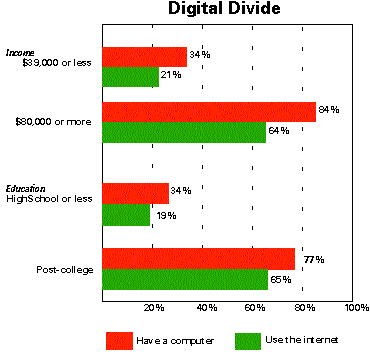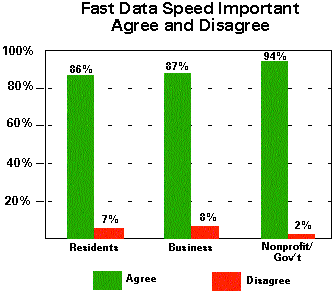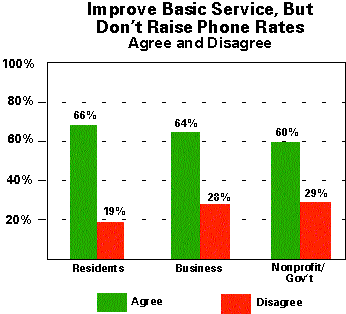|
|
|
[back]
The State's Internet Use Out Paces The Country
Recent national surveys show 42 percent of households have computers and only 19 percent are sending and receiving information on the Internet.
The same national studies show westerners have more computers and more Internet usage than the rest of the country. Colorado, with its booming economy, high personal income, and large, well-educated baby boom population, exemplifies the characteristics of the new Internet users.
Computer Facts
U.S. and Colorado Households
|
Colorado
Households
1999 |
U.S.
Households
1997/98 |
| Home computer |
51% |
42% (1) |
| Home computer with modem |
38% |
21% (2) |
| On-line with home computer |
35% |
19% (2) |
(1) Electronic Industries Association, 1998
(2) U.S. Department of Commerce, 1997
Ciruli Associates, N800, Residents, 1999
The Internet has become the world's largest communication network. The high level of Internet use among Colorado residents shown in the survey also reflects the recent increase in Internet shopping and business uses. Internet use increased nine percent a year from 1996 to 1998. And the last six months have seen a significant surge in on-line shopping, investing, entertainment and conducting business.
Digital Divide
There are significant differences among Coloradans who use the Internet. Lower income residents and those with a high school education are much less likely to have computers at home or use the Internet than their high income, post college educated fellow citizens. The Colorado on-line user is most likely to be between 35 and 54 years old, have a family income of $80,000 or more, and a college or post-college education.

Rural and Lone Eagle Internet Use
While Internet use is more likely in urban areas and along the Colorado Front Range, there are enclaves of intense Internet use in rural areas and small towns. The survey shows that residential phone lines are often used for business by residents of small towns, cities and in rural areas. Also, there are pockets of significant computer and on-line Internet users outside the Front Range metro area. The users are often farm families and so-called lone eagles (people in small, non-urban communities using the Internet to conduct retail and business activities).

Business, Government and Nonprofit Organizations Computer and Internet Use
The study of telephone usage and basic service was a collaboration between the PUC and the Office of Consumer Council (OCC). A second scientific survey of 285 businesses was authorized by OCC. Also, interviews were conducted by Ciruli Associates with 52 local government agencies and nonprofit organizations from around the state.
Colorado businesses are heavy users of computers and the Internet as are local government and nonprofit organizations. Seventy-five percent of small businesses use desktop or laptop computers at their business and 36 percent are on the Internet. All large businesses reported computer use and 73 percent are on the Internet. Nearly all local government organizations and nonprofits report computer use at the office and 69 percent are on-line.
Computer Facts
Colorado Business, Government and Nonprofits
|
Office
PC's |
Use the
Internet |
| Business |
|
|
| Less than 10 employees |
75% |
36% |
| 10-99 employees |
80% |
39% |
| 100 or more employees |
100% |
73% |
|
|
|
| Government/Nonprofit |
|
|
| Organizations |
96% |
69% |
Ciruli Associates, N285, Business, 1999
Ciruli Associates, N52, Non-business, 1999
Data Speed
The speed of data transmission on telephone lines is an important element in the quality of Colorado's information infrastructure. On average, 41 percent of residents rate their data transmission speed "slow" or "very slow." Also, a near equal number of the state's businesses (44%) rate data speed "slow" or "very slow."Complaints from the state's regions about on-line data speed range from none among government and nonprofit organizations in the metro area to half the business respondents in non-Front Range areas and Western Slope government and nonprofit organizations. Denver metro residents were least likely to express concern about data speed (36% slow and very slow). Eastern Plains and Western Slope residents were more concerned (41% slow and very slow). The highest "very slow" description of data speed was registered by Western Slope (21%) and small town on-line residents (20%).
Residents, Business, Government and Nonprofit Organizations Rate Computer Internet Data Speeds Slow and Very Slow
| Residents |
41% |
| Metro |
35% |
| Front Range |
40% |
| Easern Plains |
41% |
| Western Slope |
41% |
|
|
| Business |
44% |
| Metro |
43% |
| Front Range |
41% |
| Eastern Plains |
50% |
| Western Slope |
50% |
|
|
| Gov't. / Nonprofit |
28% |
| Metro |
0% |
| Front Range |
23% |
| Eastern Plains |
25% |
| Western Slope |
50% |
Ciruli Associates, N800, Residents, 1999
Ciruli Associates, N285, Business, 1999
Ciruli Associates, N52, Non-business, 1999
Attitudes on Data Speed and Phone Rates
Residents were asked a series of policy questions about phone service and data speed on telephone lines. Coloradans recognize the importance of fast data speeds. There is near unanimous agreement that "fast telephone data speeds are important for business, local government, schools and hospitals" (strong and somewhat agreement is above 85% for all groups).

Ciruli Associates, N800, Residents, 1999
Ciruli Associates, N285, Business, 1999
Ciruli Associates, N52, Non-business, 1999
Question: Fast telephone data speeds are important for businesses, local government, schools and hospitals.While Coloradans are supportive of providing access to additional features and services to "everyone in the state," they are price sensitive when considering expansion of basic phone service. More than 60 percent of residents and business, government and nonprofit organizations support universal access to caller ID, call waiting, call forwarding and faster data speeds, but believe "we shouldn't raise phone rates" to provide them as basic service for everyone.

Ciruli Associates, N800, Residents, 1999
Ciruli Associates, N285, Business, 1999
Ciruli Associates, N52, Non-business, 1999
Question: Everyone in the state should be able to have caller ID, call waiting, call forwarding and faster data speeds, but we shouldn't raise phone rates.
Review of Policy Issues
The major focus of the survey was to provide information to Colorado telecommunication policymakers; the Public Utilities Commission, the Governor's Office and the State Legislature, concerning the status of Colorado residents, business, government and nonprofit organizations use and satisfaction with telephone basic service, especially data speed.
The primary findings of the study were:
- Colorado residents, business, government and nonprofit organizations are heavy users of the state's telephone infrastructure for receiving and sending information by computer and the Internet.
- There are complaints about data speed from more than two-fifths of residents and businesses, with higher levels of dissatisfaction in non-metro areas.
- Coloradans recognize the importance of fast telephone data speed for business, local government and nonprofit organizations.
- The public believes people and organizations should have access to high quality telephone service and fast data speed, but not raise basic phone rates.
Survey Background
The Colorado Public Utilities Commission (PUC) and the Ofice of Consumer Council (OCC) authorized two surveys of Colorado telephone customers in order to review the services and features that shoud be included in the basic service that telephone companies must provide to all customers. The two telephone surveys were conducted in February 1999.
A telephone survey authorized by the PUC of 800 residents was conducted with customers of USWest, Century Tel/PTI/Universal and twenty-four small telephone companies.
Conducted by Ciruli Associates
Data collected February 15 to February 23, 1999
Statistical range of confidence plus or minus 4.3 percent at the 95 percentage accuracy.
A second survey authorized by the OCC was conducted with 337 business, nonprofit and government organizations statewide. Two hundred and eighty-five businesses were scientifically selected and stratified by size, activity and geography. The 52 non-business organizations included cities, towns and county governments, elementary and secondary education and junior colleges, social services and criminal justice, hospitals and health organizations, and libraries throughout the state.
Public Utilities Commission
Office Level 2
1580 Logan St.
Denver, CO 80203
303.894.2000
Office of Consumer Council
Suite 610
1580 Logan St.
Denver, CO 80203
303.894.2118
|
[top] |